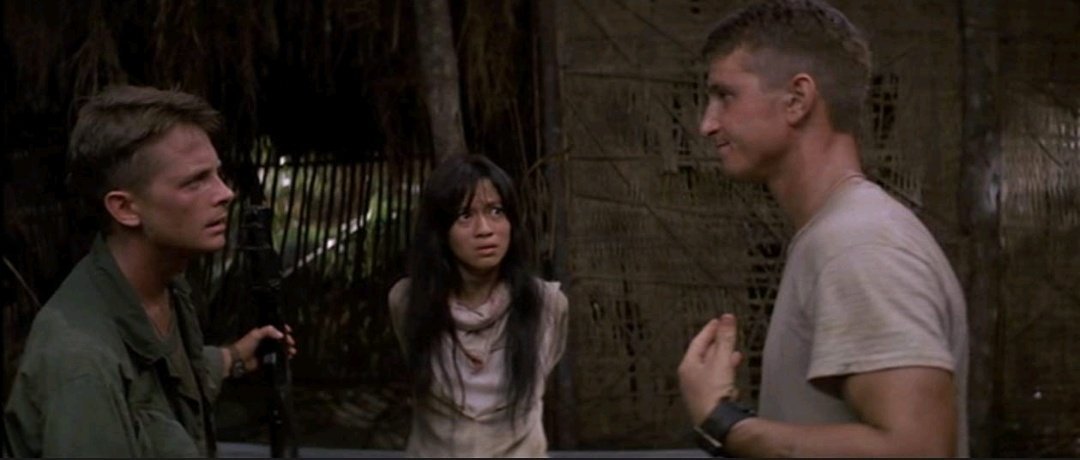"CRUELTY, AMERICAN STYLE"

At Yardbarker, Jeremy Smith takes a look at the relevance of Brian De Palma's Casualties Of War 30 years later-- here's an excerpt:
Judged strictly on its artistic merits, there’s a case to be made that "Casualties of War" is the most acutely devastating condemnation of the United States’ ravaging of Southeast Asia ever filmed. De Palma was at the height of his visual storytelling powers when he took on this production, and he presents the moral quandary with a savage concision; at no point in the film are you allowed to draw back and get your bearings. When the squad’s most beloved member, Brownie (Erik King), is gunned down with a month left on his tour, the swaggering Sgt. Meserve (Sean Penn) takes charge. Also a short-timer, he’s outraged at his friend’s horrendous luck. When he’s denied the opportunity to blow off steam with a prostitute while on leave, Meserve decides to requisition some "portable R&R" — a young Vietnamese woman named Oanh (Thuy Thu Le) — to boost morale during their next assignment. Only Eriksson (Michael J. Fox), a relatively new arrival (hence his nickname "Cherry"), openly protests, though another member of the squad, Diaz (John Leguizamo), claims he has his back. There’s hope they might be able to talk sense to the dim but seemingly decent Hatcher (John C. Reilly).Of course, when Meserve decides it’s time to make good on their brutal intentions with Oanh, Diaz buckles. It’s one against four. To his credit, Eriksson draws down on Meserve, but a very far gone Meserve delights in the standoff. "We all got weapons," he exclaims. “Anybody can blow anybody away at any second. Which is the way it ought to be. Always." Meserve already had a healthy distrust of the people he was ostensibly sent to defend, but now he views them as animals to be used and abused for his amusement. Clark (Don Harvey) is and probably always was a full-blown psychopath. But the rest of the squad still retains a sense of right and wrong; it’s just that for Diaz and Hatcher, their fear of Meserve supersedes their morality. They will participate in the gang rape. And when the time comes, they will murder Oanh rather than face the consequences of a court martial. It’s a disquieting numbers game De Palma is playing here, and according to the current electoral scoreboard in this country, it’s possible he’s being charitable.
Eriksson’s scorched conscience won’t allow him to back off on calls for a court martial (even though his superiors are desperate to sweep the incident under the rug). Whereas an Oscar bait film would portray his quest for justice as the centerpiece of the story, De Palma makes it plain that he failed by not fighting harder for Oanh when he had a chance. He tries to inform a sympathetic superior before they head out on their mission, and he threatens to take up arms against Meserve and the others prior to the assault, but he can’t bring himself to make the ultimate moral sacrifice. Should he have shot Meserve? Given the moral calculus crunched by De Palma (though not explicitly stated), yes. Better that than to be a shell of a man numbly riding the BART.
The absence of a conventionally rousing courtroom victory is the final subversive flourish of De Palma’s film. The only meaningful sentence dished out to the squad goes to Clark: life in prison. It didn’t stick. Three years after the release of "Casualties of War," the real-life Clark — a white supremacist — was charged as an accessory after the fact in the murder of African-American soldier Harold J. Mansfield. He served one year’s probation.
"Casualties of War" was a box office disappointment in 1989, but as a depiction of this country’s capacity for cruelty, it is startlingly relevant.



